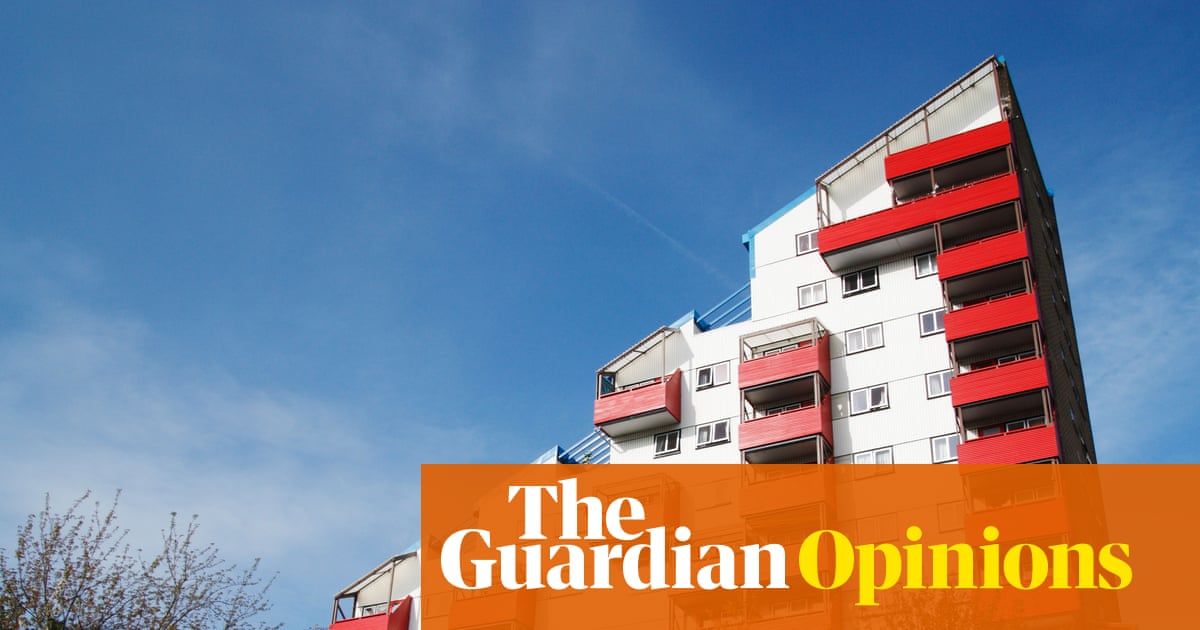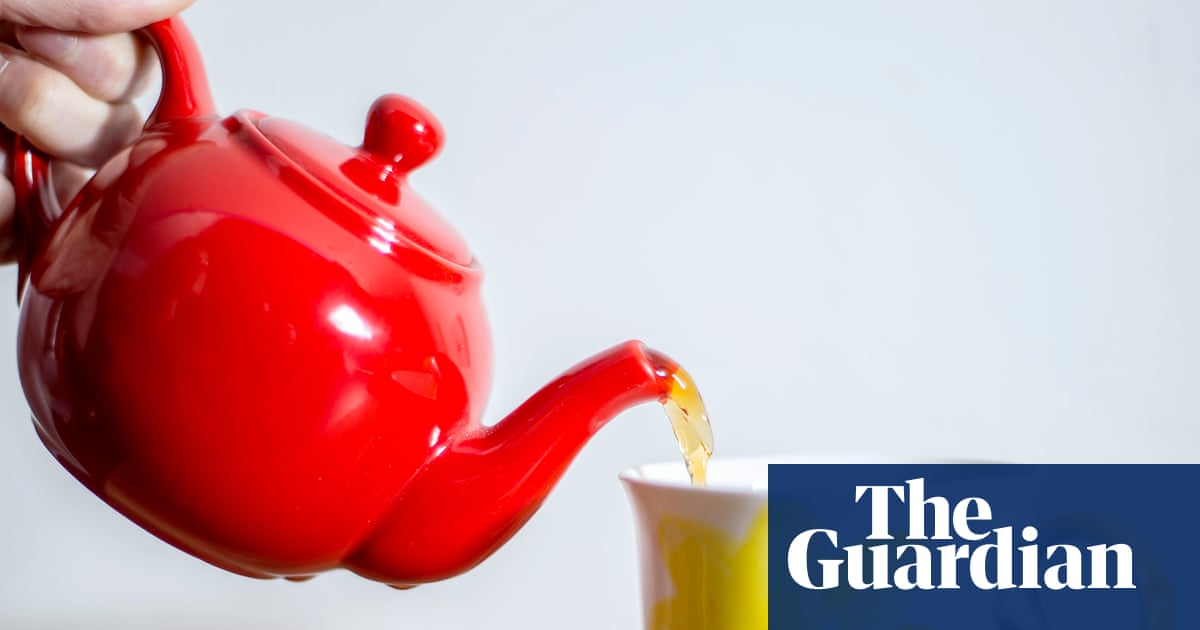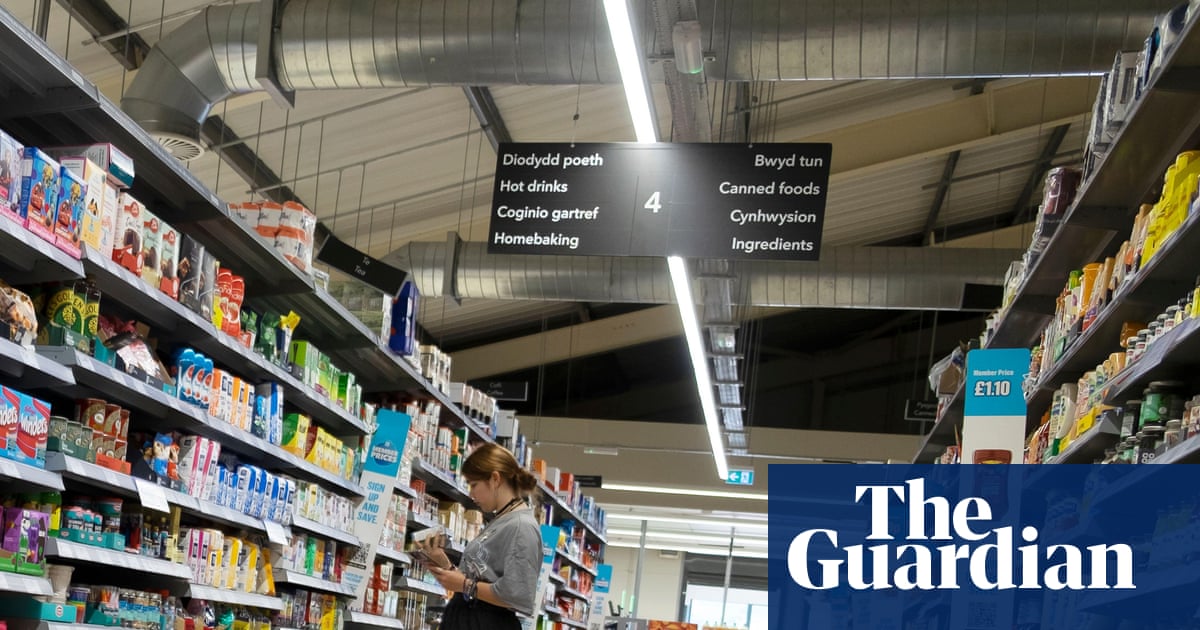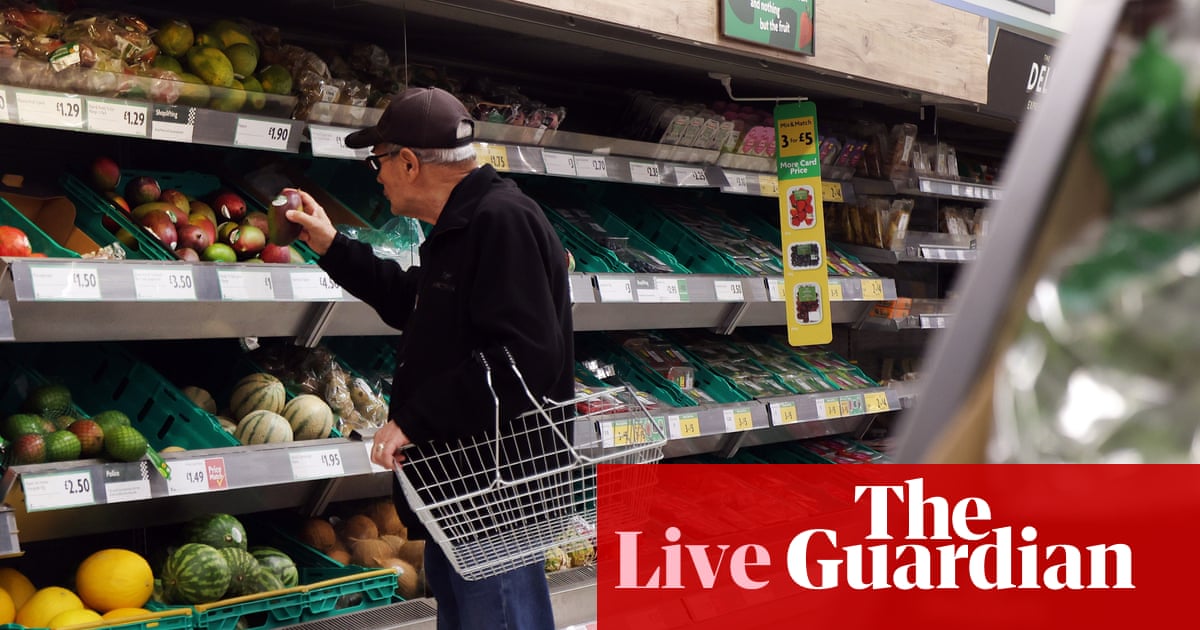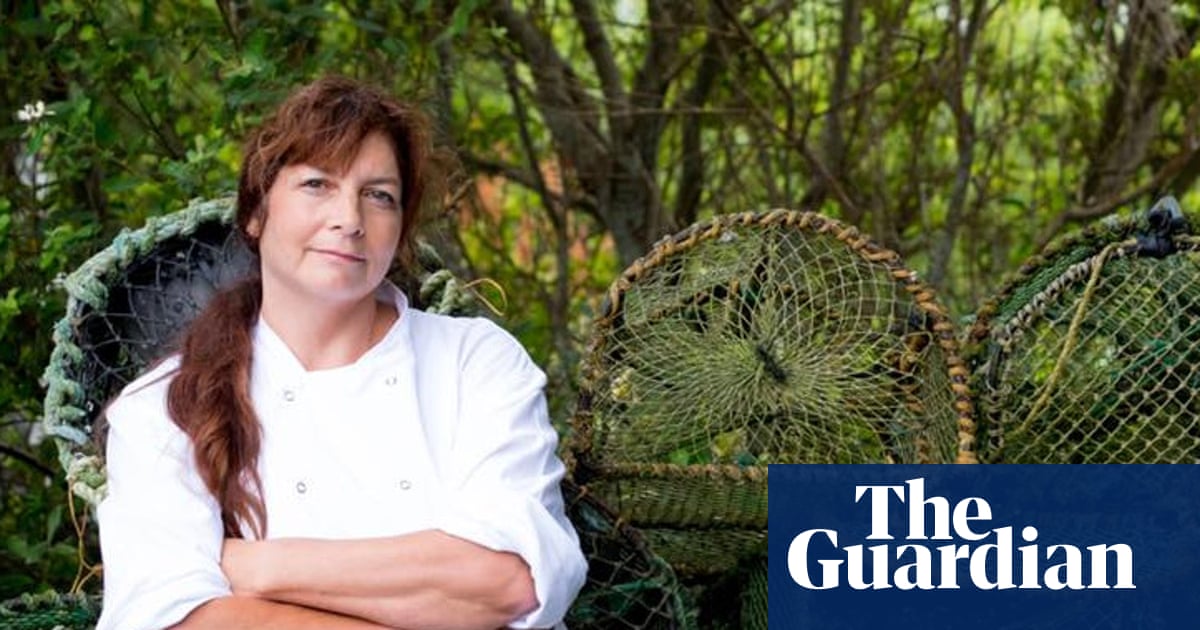Kemi Badenoch says ECHR now being used 'to attack democratic decisions and common sense'
Kemi Badenoch is now giving her speech on the European court of human rights.
She starts by referring to two Rochdale grooming gang offenders who could not be deported to Pakistan because of the ECHR.
She goes on:
The ECHR is now being used in ways never intended by its original authors. It should be a shield to protect. Instead, it’s become a sword, a sword used to attack democratic decisions and common sense.
This use of litigation as a political weapon is what I am calling lawfare. It isn’t just damaging our security, it’s also damaging our prosperity.
Key events Show key events only Please turn on JavaScript to use this feature
Badenoch says human rights law is also holding back the military.
Just before VE Day, I met a group of Chelsea pensioners. They talked about their former colleagues having to give evidence in old age and having to recall in minute detail events that happened 40 years before or risk prison.
Morale is suffering, and recruitment and retention are getting harder, just as we need to rebuild our military strength.
And it’s not just veterans. Soldiers on operations face legal challenge too. We cannot run the risk of our troops fighting a war with one hand tied behind their backs. We are going to fix this.
Badenoch says she is 'increasingly of the view' UK needs to leave ECHR
Badenoch says she is “increasingly of the view” that the UK will have to leave the ECHR.
I have thought long and hard about this, and I am increasingly of the view that we will need to leave, because I am yet to see a clear and coherent route to change within our current legal structures.
Some say reform is the answer, but I say we have tried that before. 15 years ago, the Brighton Process achieved some success, but the Strasbourg court has shown no real interest in fundamental change. It has rebuffed those European states calling for a new approach, and in its recent decisions – above on all climate change – it has shown ever greater willingness to invent new rights and directly overrule popular mandates.
But I won’t commit my party to leaving the ECHR or other treaties without a clear plan to do so and without a full understanding of all the consequences for all parts of our United Kingdom. Because we saw that holding a referendum without a plan to get Brexit done, led to years of wrangling and endless arguments until it got sorted in 2019. We cannot go through that again.
Badenoch says illegal immigrants should be removed immediately and banned from claiming asylum
Badenoch says illegal immigration is the best example of where “lawfare is destroying our country”.
I will always defend the support we gave people from Hong Kong and Ukraine, but we cannot become the destination for everyone looking for a new home or a better life.
Nor can we be the world’s softest touch. In some years, our approval rate for asylum applications was above 80% last year, Japan’s was 2%.
Britain is being mugged. Our asylum system is completely broken and will require a fundamental rebuild so that the British government, not people traffickers, control it.
That means a total end to asylum claims in this country by illegal immigrants and removing immediately all those who arrive illegally and try to claim asylum.
Badenoch says she does not believe suggestion from Council of Europe chief that ECHR could be changed
Badenoch says last month the leaders of nine European countries wrote to the Council of Europe, the body overseeing the ECHR, asking for changes to the way it operates. Alain Berset, the council’s secretary general, rejected this as political interference.
Badenoch acknowledges that Berset has now changed his line.
This is a reference to Berset telling the Times in an interview published today that he could see a case for change. Berset said:
We are witnessing a world where things are changing rapidly.
It is accelerating. We see this, and it means that it is normal that we must also adapt to this. We need adaptation. We need discussion about the rules that we want to have, and there is no taboo.
I see the necessity to adapt but we must also do this respecting our core values.
Badenoch says she intrepets this as meaning that in practice nothing will change.
Kemi Badenoch says ECHR now being used 'to attack democratic decisions and common sense'
Kemi Badenoch is now giving her speech on the European court of human rights.
She starts by referring to two Rochdale grooming gang offenders who could not be deported to Pakistan because of the ECHR.
She goes on:
The ECHR is now being used in ways never intended by its original authors. It should be a shield to protect. Instead, it’s become a sword, a sword used to attack democratic decisions and common sense.
This use of litigation as a political weapon is what I am calling lawfare. It isn’t just damaging our security, it’s also damaging our prosperity.
Tice defends Reform UK calling for debate on banning burqa, after proposal blamed for party chair's resignation
Richard Tice, the Reform UK deputy leader, has defended his party calling for a debate a debate on whether the burqa should be banned.
Yesterday Zia Yusuf, a Muslim multi-millionaire businessman, resigned as Reform’s chair. He had been in charge of professionalising the party – work that he seemed to be doing quite successfully – and his surprise decision to quit is seen as a blow to Nigel Farage. Here is Rowena Mason’s story about the resignation from last night.
In a post on social media, Yusuf did not give a full explanation for his decison to quit beyond saying he now longer believed “working to get a Reform government elected is a good use of my time”. But he announcement came about nine hours after he posted another message saying the decision of the party’s new MP, Sarah Pochin, to ask a question at PMQs implying that she favoured banning the burqa was “dumb”.
Banning the burqa is not officially Reform party policy. But Pochin implied it should be, and she was backed up by her fellow MP Lee Anderson who posted a message on social media on Wednesday saying:
Ban the burqa?
Yes we should.
No one should be allowed to hide their identity in public.
In an attempt to reconcile these various positions, Tice told the Today programme this morning that the party was in favour of this matter being debated. He said:
I think it is right that we should have a debate about whether or not the burqa is appropriate in a nation that’s founded in Christianity, where womenare equal citizens and should not be viewed as second-class citizens.
What’s interesting is lots of people are trying to sort label us and say, ‘You shouldn’t have this debate, it’s naughty of you to ask’. Why shouldn’t we? If we’re a great democracy that believes in free speech, let’s have a calm and respectful debate. Most people wouldn’t be aware that seven or eight nations across Europe have already banned the burqa. So let’s have a discussion. Let’s have a debate.
Asked if he was minded to support a ban, Tice said that he was concerned about the idea the burqa was a “repressive item of clothing”.
When Anna Foster, the presenter, put it to him that she had spoken to many women who want to wear the burqa, and that banning it would take away that choice, Tice claimed that was why a debate was needed.
Asked about Yusuf’s resignation, Tice he said he had not spoken to him since the announcement but that he was “enormously sad” he had gone.
The Hamilton byelection result shows that there is strong support for progressive politics in Scotland, according to Stephen Boyd, director of IPPR Scotland, a left-of-centre thinktank. He said:
Two thirds of votes cast went to progressive parties, while a quarter voted for a party promising to shake up the political establishment.
Scottish politicians should take heart that voters want a fairer, greener future, but must also recognise the work now needed to set out a compelling and positive vision for how to get there.
This should include a much bolder agenda to address persistent concerns around the cost of living, public services, poverty and housing- issues that help explain Reform’s momentum.
Far from being a defensive contest mired in negativity, the 2026 election is a battle for the high ground.
Downing Street exploring options for ‘progressive’ UK digital IDs
As Jessica Elgot and Amelia Gentleman report, Downing Street is exploring new proposals for a digital ID card to crack down on illegal migration, rogue landlords and exploitative work, set out in a policy paper authored by a centre-left thinktank.
Steve Reed, the environment secretary, was the government voice on the media this morning and he confirmed that the government is interested in this idea. He told Times Radio:
It’s absolutely something that we are looking at, and that we should be looking at.
We know we need to look at all the actions we can take to stop the levels of illegal migration that we were seeing particularly under the last government.
We have to stop the number of people that we’ve seen who don’t have a right to come here.
Hamilton result suggests SNP on course to be largest Holyrood party after 2026 elections, but 'diminished', says John Curtice
Prof Sir John Curtice, the leading elections expert, told the BBC this morning that, although many people expected the SNP to win the byelection in Hamilton, Larkhall and Stonehouse, if they had had been following the evidence closely, they would have realised it was always neck and neck. He said the SNP won the seat quite easily in 2021. But he said if you track how Labour and SNP support has changed nationally since then, and adjust the 2021 Hamilton result accordingly, you would have both parties on 31% in the constituency. He went on:
In other words, this contest always looked likely to be a very close contest. That’s what it’s proven to be.
In the end, Labour have done a little bit better than 31%, they’ve got 32%, and the SNP a little worse, 29%.
But there’s nothing in this result that suggests that Labour have turned around the reverse in the polls that they have suffered since the summer of last year. Though, equally, what is also true there is no sign in this result that the SNP are making much progress in reversing the losses that they suffered in support last year.
If you put those two things together, that means that the recent message of the opinion polls, which is the SNP are running just over 30% and Labour are running around 20% or so, that still seems to be a perfectly reasonable expectation.
And of course, such a result would not mean that Anas Sarwar (the Scottish Labour leader) was Scotland’s next first minister.
Asked about the Reform UK result, Curtice said:
It certainly means that Reform are making the political weather north of the border, as indeed they are south of the border.
This was the one bit of the result that was, to some degree, a surprise.
Reform are making progress in Scotland in the polls, as they are south of the border, but they’ve been running around 19/20%. Now in Hamilton, they’ve got 26%.
They’re certainly doing damage to the Conservatives who are down to 6%. It looks as though around one in four Conservative voters in Scotland – that is, Conservative voters as of last summer – are switching to Reform.
But, frankly, also one of the reasons why Labour’s victory is so narrow and is based on a lower share of the vote than Labour got in this constituency in 2021, and well down and what they got in the area last summer, is because Labour in Scotland are also losing more than one in six of their voters to Reform.
So the truth is Reform are damaging both the two principal unionist parties in Scotland. In this instance, not enough to save the SNP’s bacon.
But, more broadly across Scotland, there is still the likely prospect that the SNP will be the largest party in next Holyrood parliament, though probably a much diminished and much less powerful party than the one that currently occupies the Holyrood chamber.
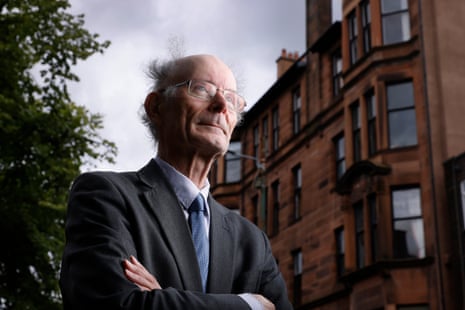
Richard Tice says coming from 'nowhere' to being not far behind SNP 'incredible result' for Reform UK
Richard Tice, the Reform UK leader, told the Today programme this morning that his party had achieved an “incredible” result in the byelection. He said:
It’s truly remarkable. We’ve come from nowhere to being in a three-way marginal, and we’re within 750 votes of winning that byelection and just a few hundred votes of defeating the SNP, so it’s an incredible result.
Reform were actually 1,471 votes behind Labour. They were only “within 750 votes of winning” in the sense that, if they had managed to get 750 people who voted Labour to vote Reform instead, they would have come first.
Reform were also 869 votes behind the SNP – slightly more than “just a few hundred” implies.
Here are some more pictures from the byelection count at the South Lanarkshire council HQ in Hamilton last night.
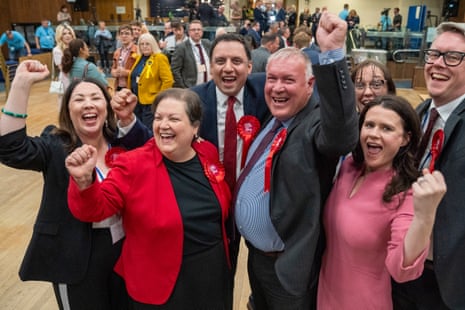
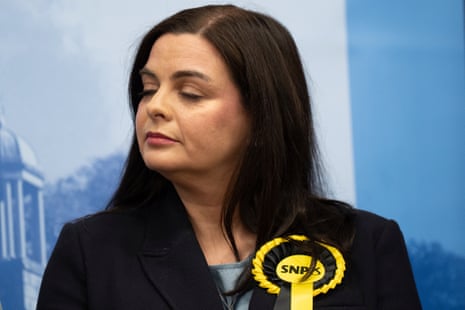


John Swinney says SNP defeat in Hamilton byelection shows party has to offer 'vision of hope and optimism'
Here is an extract from the full statement John Swinney, the SNP leader and Scottish first minister, issued after the byelection result was announced. He said it showed the need for the SNP to offer “a vision of hope and optimism”.
Labour won by an absolute landslide in this area less than a year ago - we came much closer tonight but the people of Hamilton, Larkhall and Stonehouse have made clear that we still have work to do. Over the next few days we will take time to consider the result fully.
When I became leader of the SNP last year I made clear my intention to bring the party together and focus more than ever on standing up for the people of Scotland. During this campaign we heard a lot of anger about the cost of living - and it is clearer than ever that Westminster control is making Scotland poorer, whether that is the damage of Brexit, the hike in energy bills or the betrayal on the winter fuel payment.
Between now and May’s election, I and the SNP will set out a vision of hope and optimism. We will show people in Scotland that a better future is possible by taking decisions for ourselves - and that is how we will win in 2026.
Keir Starmer was not the only party leader to congratulate Davy Russell on his win in the Hamilton byelection. John Swinney, the SNP leader and Scottish first minister, did so too in this social media post after the result was announced.
Congratulations to Davy Russell on his election as MSP for Hamilton, Larkhall and Stonehouse. @KatyLoudonSNP fought a superb @theSNP campaign. We have made progress since the election last year but not enough. We still have work to do and we will do it.
Congratulating your opponents if they win an election is a conventional courtesy in democratic politics, but it does not always happen.
Here is an analysis of the significance of the Hamilton byelection result from Severin Carrell, the Guardian’s Scotland editor.
And here is an extract.
Some voters have been visited four times by Labour canvassers and politicians: Labour MPs and MSPs flooded the constituency – in part because the UK party, from Keir Starmer downwards, knew they could not afford further humiliation at the hands of Reform.
It seemed in the final days of the campaign that Reform’s “air war” was seriously wounding Labour’s campaign: Farage revealed on Monday that a Scottish Labour councillor, a young man who had previously been chair of Glasgow University’s Labour students group, had defected to Reform. That did shock the party.
But in the event, the ground war won – to the great relief of a UK party that has just been pummelled by Reform in Runcorn and England’s recent council elections. “I think we have the better field operation and we’ve been around people’s doors,” the strategist said. “We’re hungry for the votes and people see that.”
What commentators are saying about Hamilton byelection result
Here is a round up of what some of the best commentators are saying about the Hamilton byelection result on social media.
From Rob Ford, a politics professor and elections expert, on Bluesky
Few Hamilton by-election thoughts: 1. Expectations matter - this was an area where Labour won a Westminster by-election on a massive swing less than two years ago and won in a general election less than one year ago get Labour’s victory yesterday is a massive shock given poling woes.
2. Scotland is still different - people based expectations of a 3rd place Lab finish on British polling drop but forget Labour advanced far further in Scotland than elsewhere. Labour standing still in Hamilton is actuallly consistent with Lab rise and fall in Scotland
3. The SNP haven’t rebounded - their decline over past few years hasn’t reversed, suggesting a more fragmented Scottish Parl contest coming next year
4. Reform are now a force on Scotland - 26% is easily Farage’s best ever Scottish result and while he didn’t win this time, he is still set to become a major force in Scottish politics for the first time next year
5. Scottish Tories are in deep trouble - granted, this isn’t one of the parts of Scotland where they do better but this was a dire result for them. Reform may be a more appealing option for socially conservative unionists, displacing them altogether in much of Scotland
6. Fragmentation makes things unpredictable! Only 5.5% separated first and third here. Such a narrow result could easily have broken differently and local candidates and campaigns could have made a difference.
7. This will be a massive morale boost for Labour in general & campaigns teams in particular - losing Runcorn by a tiny margin will have hurt and polling wise the picture has been uniformly grim. Pulling out a surprise win and confounding conventional wisdom will put a spring back in many steps.
From Patrick Maguire, the Times’ chief political commentator
Labour gain Hamilton. That is massive.
Squeaking through a tight three-way scrap by that sort of margin in the seat where Morgan McSweeney lives. Too on the nose.
Morgan McSweeney, Keir Starmer’s chief of staff, is Irish. But he is married to Imogen Walker, the MP for Hamilton and Clyde Valley.
After the Glasgow Garscadden by-election in 1978, Donald Dewar said: “This changes the whole psychological climate of Scottish politics.” Could surely say the same tonight.
See also: “Reform come third in Hamilton.” Yeah. Having come from nowhere to 26 per cent, five points behind the winner — in the central belt of Scotland! — with a single member of staff north of the border and nothing resembling Labour and the SNP’s activist base and ground game
From Ballot Box Scotland, a Scottish elections website, on Bluesky
Labour will certainly be pleased to win this one, but that’s a pretty close result; if you run these as uniform swings versus 2021, it only secures a total of 8 Labour constituency MSPs versus 51 for the SNP. As I’ve said before, this was must-win for Labour, but margin matters, and it’s not huge!
A sort of balance of caveats here as well: a 2.1% Labour majority, with 3.6% for Pro-Independence parties who won’t stand for the constituency in 2026, which will help the SNP. At the same time, don’t expect as high a Reform share outside the white heat of a by-election, which will help Labour.
Labour constituency vote on a national swing like this: 19.6% Labour constituency vote in most recent poll: 19% SNP constituency vote on a national swing like this: 30.9% SNP constituency vote in most recent poll: 33% Reform much further off but for top two, result consistent with national polls.
From Luke Tryl, director of More in Common UK and another elections expert, on Bluesky
Big result on lots of levels - just one by-election but: 1. SNP’s struggles from last years General Election clearly aren’t over 2. For Labour to gain is impressive even on a lower vote share 3. Reform just 1500 off a win shows their presence in Scotland is real.
Obviously the win is what sets the agenda however narrow (see Runcorn!) But worth noting while Labour’s vote is only just down from 2021 that was their worst ever Scottish results and their support it is down from close to 50% compared to seats covering the same areas in Westminster last year
Still winning a by election in (Westminster) govt isn’t easy and wins in by elections set the momentum
For the SNP this means more soul searching, they should have been in a position to capitalise on Labour discontentment but their vote share is similar to last year’s dreadful GE results (in overlapping seats). In our focus group people felt the SNP still hadn’t found their way post sturgeon
For Reform they have clearly built a credible base of support since the General Election in Scotland, making raw vote not just % gains. If (and it’s a real if given recent turmoil) they can hold it together they could be a formidable force in the Scottish Parliament next year
Further take away - We could be heading for a very messy election next year: on the sorts of swings we saw last night it’s not clear that you’d be able to form a stable Government at Holyrood.
From ITV’s political editor, Robert Peston
To an extent Labour’s Hamilton gain is about Reform again. On the eve of the poll, the SNP told me they saw the Reform surge and that it would knock Labour into third place. Instead Reform has taken share from the incumbent, the SNP, and deprived the SNP of the seat. Once again, Reform is a manifestation of “a curse on all your houses”
From Lewis Goodall from the News Agents podcast on Bluesky
Well that changes the entire feel of Scottish politics in the long run up to Holyrood elections next year. Labour GAIN in Hamilton. SNP still struggling. Lab down on % in general election but up on 2021. Strong Reform result. Tories absolutely nowhere and supplanted by them.
Result a good parable of politics across GB at the moment. Highly fragmented, highly multi party, with that fragmentation guaranteed to deliver unpredictable results and wind for parties on tiny margins.
Full results from Hamilton byelection
Here, from PA Media, are the byelection results in full.
Labour gain from SNP
Davy Russell (Lab) 8,559 (31.57%, -1.99%)
Katy Loudon (SNP) 7,957 (29.35%, -16.84%)
Ross Lambie (Reform UK) 7,088 (26.15%)
Richard Nelson (C) 1,621 (5.98%, -11.47%)
Ann McGuinness (Green) 695 (2.56%)
Aisha Mir (LD) 533 (1.97%, -0.82%)
Collette Bradley (SSP) 278 (1.03%)
Andy Brady (SFP) 219 (0.81%)
Marc Wilkinson (Ind) 109 (0.40%)
Janice MacKay (UKIP) 50 (0.18%)
Lab maj 602 (2.22%)
7.42% swing SNP to Lab
Electorate 61,485; Turnout 27,109 (44.09%, -16.62%)
2021 result: SNP maj 4,582 (12.63%) – Turnout 36,284 (60.71%)
McKelvie (SNP) 16,761 (46.19%); Lennon (Lab) 12,179 (33.57%);
Gallacher (C) 6,332 (17.45%); McGeever (LD) 1,012 (2.79%)
Starmer hails Labour victory after surprise win in Hamilton byelection for Scottish parliament
Good morning. Assuming he was not still up at 1.36am, Keir Starmer woke to good news this morning – Labour winning the byelection in Hamilton, Larkhall and Stonehouse for the Scottish parliament. It has gained the seat with a 7.4% swing from the SNP.
This is a surprise. A week ago the SNP were press releasing a Norstat poll for the Times suggesting they were ahead by 33%, with Labour on 19% and Reform on 18%. And the bookies had the SNP in the lead too. Yesterday one firm had the SNP as firm favourites, followed by Reform, with odds of 11/1 available to anyone prepared to bet on Labour. Presumably someone has made some good money. For the rest of us, this is a welcome reminder that opinion polls, and bookies’ odds, are not always a sound guide to results, particularly in byelections.
Starmer was criticisised for not campaigning in Hamilton. But he did announce a big U-turn on the winter fuel payments while the campaign was taking place, and that may have helped get his candidate, Davy Russell, over the line.
This morning Starmer posted this message on social media.
Congratulations to @DavyRussell4HLS and the team on a fantastic victory. People in Scotland have once again voted for change.
Next year there is a chance to turbo charge delivery by putting Labour in power on both sides of the border.
I look forward to working with you.
A win is a win, and this is good news for Labour. But, as the leading psephologist John Curtice has been telling the BBC this morning, the Reform UK vote is significant too. They came from nowhere to a strong third place, with 26% of the vote. The Conservatives, on 6%, only just avoided losing their deposit.
Here is our overnight story by Libby Brooks, Rachel Keenan and Severin Carrell
I will be posting more reaction to the result, and analysis, shortly.
Here is the agenda for the day.
11am: Kemi Badenoch gives a speech where she will say she is “increasingly of the view” that the UK should withdraw from European convention on human rights.
11.30am: Downing Street holds a lobby briefing.
If you want to contact me, please post a message below the line when comments are open (normally between 10am and 3pm at the moment), or message me on social media. I can’t read all the messages BTL, but if you put “Andrew” in a message aimed at me, I am more likely to see it because I search for posts containing that word.
If you want to flag something up urgently, it is best to use social media. You can reach me on Bluesky at @andrewsparrowgdn.bsky.social. The Guardian has given up posting from its official accounts on X, but individual Guardian journalists are there, I still have my account, and if you message me there at @AndrewSparrow, I will see it and respond if necessary.
I find it very helpful when readers point out mistakes, even minor typos. No error is too small to correct. And I find your questions very interesting too. I can’t promise to reply to them all, but I will try to reply to as many as I can, either BTL or sometimes in the blog.

 3 months ago
103
3 months ago
103


